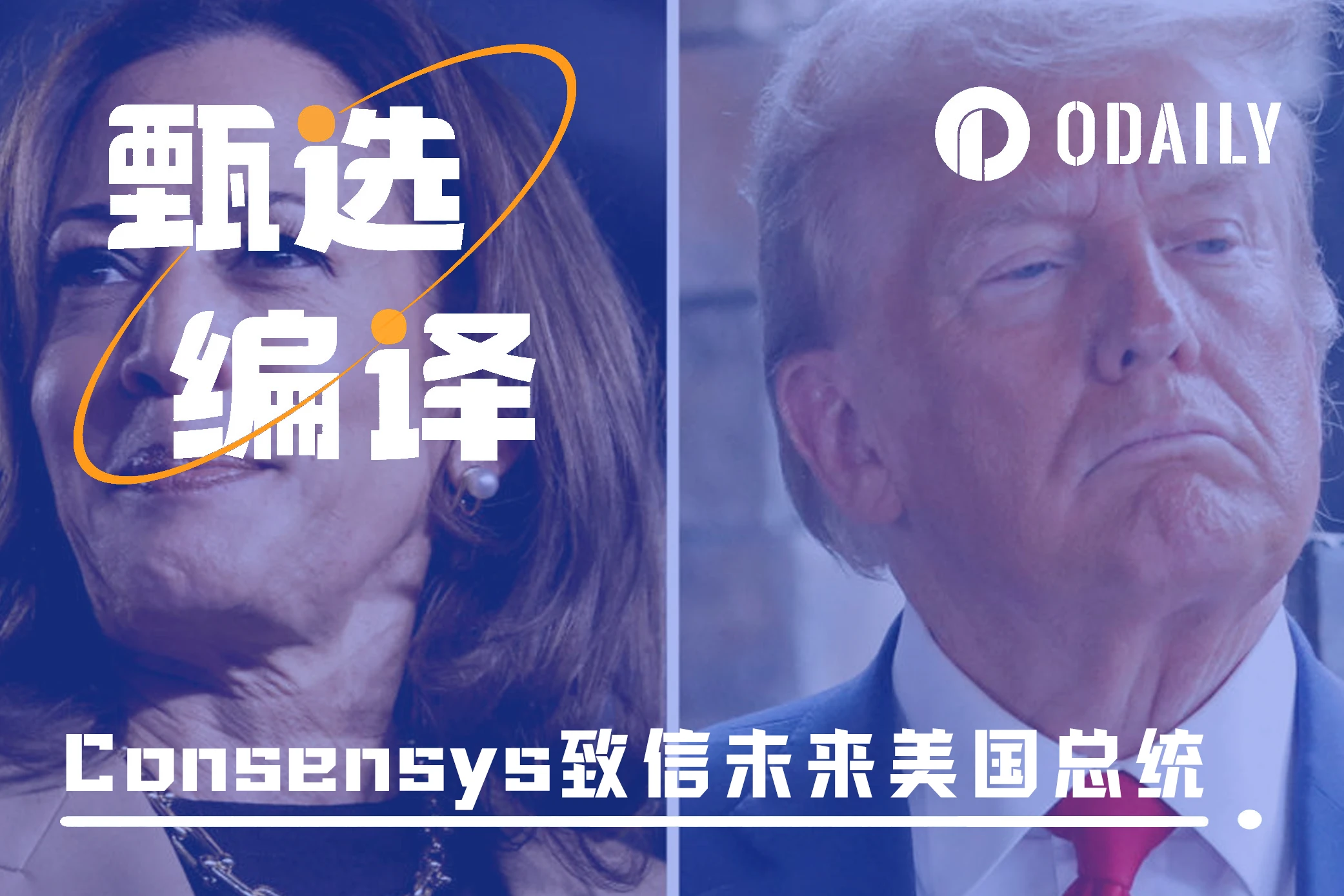Original article from Consensys
Compiled by Odaily Planet Daily Golem ( @web3_golem )

Editors Note: The final results of the 2024 US election will be announced on November 5. According to Polymarkets forecast market data, the current probability of Trumps election is 59.9%, and Harriss probability of election is 40%. The crypto industry is one of the groups that pays the most attention to the US election, because the president-elects regulatory attitude and policy on cryptocurrencies will affect the development of the entire industry. Previously, many crypto companies have been sanctioned by the US regulatory iron fist, including Binance, Coinbase, Uniswap, Consensys, etc.
Therefore, in this context, in order to improve the crypto regulatory environment, Consensys published a letter to the future US president in the Wall Street Journal, calling not only policymakers to take action, but also American voters to take action. Odaily Planet Daily has compiled the full text of the letter as follows for readers reference.
Dear Mr./Madam President:
We write to you with the clear conviction that a vibrant, supportive environment for digital asset innovation is critical to the future of the U.S. economy and its global technological leadership.
Regardless of the outcome of the upcoming U.S. presidential election, we are deeply concerned about the U.S.’ approach to digital asset regulation and enforcement. Contrary to the misguided belief that this technology is unimportant or fleeting, blockchain and cryptocurrencies have gained popularity in the U.S. (and around the world) despite the lack of a regulatory framework and often arbitrary and disingenuous enforcement actions against organizations that strictly adhere to the law, which provides space for bad actors to thrive.
To incentivize innovation, create next-generation internet jobs in America, protect American investors and interests, and promote technological collaboration, we recommend that you take the following three necessary steps as you consider your administration’s stance toward the blockchain industry and its millions of industry participants across the country.
Providing regulatory certainty and transparency to avoid arbitrary or excessive enforcement against good actors
While some have been promoting the narrative that the blockchain industry is trying to evade all regulation, this is simply untrue. Nothing is more important for a thriving crypto ecosystem than a clear and workable regulatory framework that defines how intermediaries that interact with customers should operate.
However, in contrast to other OECD member countries, the United States has a notable absence of clear executive action, in which companies and developers are left in the dark and asked to defend the legality of their livelihoods in ad hoc enforcement actions when they would rather comply with clear rules and regulations.
The next administration and its relevant regulators must work with Congress to clarify and ultimately provide a path for legal participation in the Web3 ecosystem. This will enable entrepreneurs to operate companies with confidence, make meaningful contributions to the United States, and usher in the next generation of Internet technology.
Promoting greater consumer protection and preventing illegal activity
While illicit activity involving digital assets remains relatively low compared to traditional finance or cash itself, the decentralized nature of blockchain software does present new security challenges. Overcoming these issues will require increased education about the risks inherent in decentralized finance, public-private partnerships and information sharing, as well as greater global uniformity in regulating exchanges.
The great paradox is that blockchain technology itself is uniquely positioned to combat illicit finance. It offers the opportunity to improve data security, track criminal activity, and stop it at its source. The blockchain industry stands ready to work with the next president to explore how the U.S. government can harness this powerful technology and help protect against bad actors.
Encouraging continued innovation in the blockchain space
We are at a crossroads in the global development of blockchain technology. The industry has the potential to lead us into the next phase of the internet, where content, identity, ownership, security, and accessibility are controlled by the users themselves. Any barriers to innovation will allow other countries (including some with hostile interests) to surpass us and trap the United States in a digital world ruled by others.
Therefore, the next president must do all he can to encourage the development of Web3 technologies, including creating research and development opportunities, reducing unnecessary bureaucratic barriers, and investing in infrastructure to support their growth.
The fundamentals of encryption are also rooted in American values: individual freedom, economic opportunity, and privacy. The role of the encryption industry in driving progress, accountability, and fair access should be protected and nurtured by governing bodies. We respectfully urge you to adopt these key steps to create a more hopeful future for these technologies and all those who rely on them for their livelihoods.










